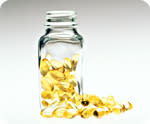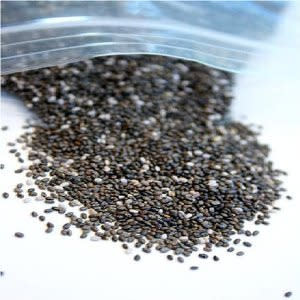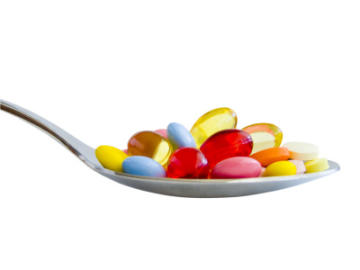Do You Really Need Vitamins?
I eat well. I don't need no stinkin' supplements.
Used this excuse before? Sorry to burst your bubble, but not all "healthy" people eat a balanced diet. Yeah, you know who you are.
Special Needs
Numerous studies have shown that a plant-based diet can significantly reduce risk of chronic illnesses, like diabetes, heart disease and cancer. But before you get all self-congratulatory about your dietary discipline, you should know that vegans may be at risk for deficiency in a ton o' other stuff: calcium, vitamin B12, vitamin D, zinc, riboflavin and essential fatty acids.
Food vs. Supplements
Many of the nutrients needed for a healthy vegan diet can be found in food sources. The one exception is vitamin B12, a critical component in red blood cell formation and DNA production. Symptoms of B12 deficiency include fatigue, shortness of breath, dizziness, numbness, heart palpitations, nausea, poor appetite, diarrhea and anemia. To avoid feeling like you've been run over by a Mack truck, it's important to get your fix of this key vitamin.
The Right Stuff
Though primarily found in animal products, B12 is also present in certain plant foods such as soy, nori and chlorellla. The problem for vegans is that B12 from plant sources is not as biologically active and therefore not as easily utilized by the body as the B12 from animals. Not to worry. You can get a boatload of B12 by eating the right foods - cereals, brewer's yeast, non-dairy milks and tempeh - or by taking a B12 supplement. Try Garden of Life or Deva.
Other Important Nutrients
What are the other power players that every veggie or vegan should be vigilant about? So glad you asked.
Calcium: Needed for many bodily functions, calcium also keeps those bones and immune system strong. Instead of eating nasty-mucus dairy products, get your calcium from soy products, legumes, almonds, sesame tahini, dark, leafy vegetables and calcium-fortified orange juice.
Vitamin D: Vitamin D regulates the formation of bone and the absorption of calcium. There is also growing evidence that low vitamin D levels contribute to cancer and autoimmune disease. Good ol' sunshine is the best source of vitamin D, so get your booty off the couch and go for a walk without any sun protection for 15-20 minutes a day (But don't even think about substituting a tanning bed for the real thing, missy). During the winter months, you'll most likely need vitamin D supplementation, so aim for 1000 - 2000 IU of D2 (D3 is more easily absorbed, but the main source is animal).
Zinc: This essential trace mineral boosts thyroid and immune system function. Get it from soybeans and soymilk, fortified breakfast cereals, nuts, breads, mushrooms, peas, wheat germ and pumpkin seeds. Most people need 8-15 mg daily.
Riboflavin: Also known as Vitamin B2, riboflavin is required for the proper development and function of skin, lining of the digestive tract and blood cells. Almonds, fortified cereals, mushrooms and soymilk are rich sources. Riboflavin has also been shown to help prevent migraine headaches and cervical cancer.
Omega-3 Fatty Acids: Studies have shown that EPA and DHA - two types of fatty acids - have the most health benefits, including reducing the risk of heart disease. DHA is especially important since it's the primary fatty acid in the human brain - deficiency has been linked to Alzheimer's disease. The best food source of EPA and DHA is seafood, but vegans can opt for flaxseed, hemp, walnut, soy and canola oils, or take 500 mg a day in supplement form. Some good vegan omega-3 brands include Opti 3 and Deva Vegan Omega-3.
Pill Popping
So what's the verdict on supplements? Most health experts agree that you should probably be popping a pill - even if your diet is flawless. There are enough toxins in our air, water and environment that a multivitamin can be helpful to your bod. A few things to remember:
Check expiration dates, since vitamins lose their potency over time.
Pair supplements with food. Nutrients work in conjunction with each other, and you're also less likely to get a tummy ache.
Avoid fat-free diets. If you are taking any fat-soluble vitamins like D or A, you need to have some fat in your meal to enhance absorption.
Ask your doctor before popping any new pills. Supplements can interact with prescription and over-the-counter (OTC) medications.
For more info on supplements and topics like this, visit www.healthybitchdaily.com




